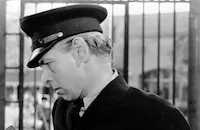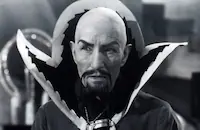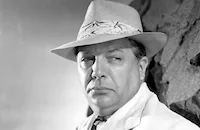Blackmail

Brief Synopsis
Cast & Crew
H. C. Potter
Edward G. Robinson
Ruth Hussey
Gene Lockhart
Bobs Watson
Guinn Williams
Film Details
Technical Specs

Synopsis
John R. Ingram, a fugitive from justice, has built a new life as a family man and an expert at extinguishing oil well fires. After years of fighting well fires with his friend, Moose McCarthy, John finally saves enough money to sink a well of his own. John returns home one day to find William Ramey, a former shipmate who knows that he escaped from a chain gang after being convicted of stealing money from the ship's purser. Ramey admits to stealing the money himself and offers to confess in exchange for $25,000, to be secured by a note on the well. Blinded by the promise of clearing his name, John consents to Ramey's terms, but the wiley Ramey tricks him and, after obtaining the signed note to the well, informs the police that John is a wanted man.
John is arrested and, after his appeal is denied, is sent back to the chain gang in Georgia. Although imprisoned by the sadistic system of the chain gang and robbed of his family and home, John remains determined to serve his time until he learns that his wife and son have been driven to poverty while Ramey grows rich on the profits of the well. John suffers a series of brutal punishments, but his vow of revenge does not dim, and when he reads that Ramey is planning to sell the well for a fortune, he smashes free from captivity and eludes a cross country pursuit to return home to Oklahoma. Realizing that his only hope lies in forcing a confession from Ramey, John sets fire to the well to lure Ramey back to Oklahoma. After trapping Ramey on the brim of the blazing well, John forces him to confess all, thus winning back his family, his freedom and his well.

Director

H. C. Potter
Cast

Edward G. Robinson

Ruth Hussey

Gene Lockhart

Bobs Watson

Guinn Williams

John Wray

Arthur Hohl
Esther Dale

Charles Middleton
Joe Whitehead

Joseph Crehan
Victor Kilian
Gil Perkins
Mitchell Lewis
Ted Oliver
Lew Harvey

Willie Best
Art Miles
Robert Middlemass
Ian Miller
Hal K. Dawson
Philip Morris
Trevor Bardette
Everett Brown
Ed Montoya
Joe Dominguez
Eddy Chandler
George Cooper

Lee Phelps

Cy Kendall
Harry Strang
James C. Morton
Frank Darien
Wade Boteler
Jack Daley
Harry Fleischmann
Louis Natheaux
Crew
Endre Bohem
Nathalie Bucknall
Howard Campbell
John W. Considine Jr.
Clyde De Vinna
Charles Dorian
Cedric Gibbons
David Hertz
Brown Holmes
Gilbert Kurland
Albert E. Levoy
William Ludwig
Howard O'neill
Douglas Shearer
David Snell
Dolly Tree
Charles Trego
Edward Ward
Edwin B. Willis
Dorothy Yost

Videos
Movie Clip


Trailer
Film Details
Technical Specs

Articles
Blackmail (1939) - Blackmail
By Richard Harland Smith

Blackmail (1939) - Blackmail
Quotes
Trivia
Notes
A news item in Hollywood Reporter notes that the production of this film was delayed for several weeks because of script revisions. Other items in Hollywood Reporter add that the swamp sequence was filmed on location at Whittier, CA and the oil field sequence was shot at San Pedro, CA. In the notice of tentative credits of Screen Achievements Bulletin, Maurine Watkins was credited with "substantial contribution to dialogue," but her name does not appear in the final draft of the Screen Achievements Bulletin credits.















